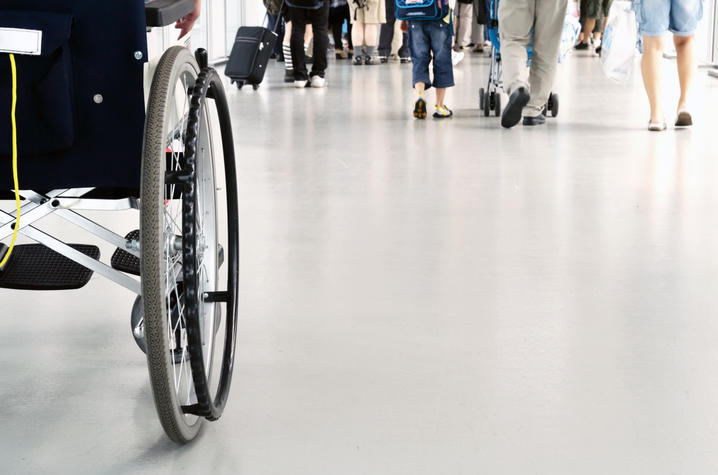UK HDI researchers study air travel accessibility for people who use wheelchairs
LEXINGTON, Ky. (March 24, 2023) — March is Disability Awareness Month and a time when there is increased awareness about the challenges people with disabilities face while finding ways to promote independence and inclusion in today’s world.
Two researchers at the University of Kentucky Human Development Institute (HDI) are working to better understand the challenges Kentuckians who use wheelchairs face in air travel.
Walt Bower, Ph.D., preservice training coordinator, and Julie Pfeiffer, a Ph.D. student in the College of Education and a graduate research assistant at HDI, are laying the groundwork for further academic research on this issue.
As part of their research, Bower and Pfeiffer are interviewing Kentuckians who use wheelchairs to understand their experiences. The two will collect and document experiences and perceptions on what needs to change to make the air travel process more accessible.
“It's important to understand the experience from the person who is experiencing it. That’s why our specific research is needed because that is missing from the academic research in this field right now,” said Pfeiffer.
Pfeiffer has a background in physical therapy and has worked with people new to using a wheelchair to prepare for air travel scenarios. She has heard dozens of stories from people about airlines damaging wheelchairs and the general difficulties of navigating airports and airplanes.
One of their colleagues at HDI knows the challenges first-hand. During a recent trip, Joe Cowan, a member of the institute’s consumer advisory council, was told his wheelchair wouldn’t fit in the plane’s cargo and he’d likely need to take a different flight.
“That didn’t sit well with me,” Cowan said. “That should not happen. They should be able to transport me and my chair. Just because I have a disability, they shouldn’t say, ‘You know, you have to use a special plane, or you have to do this.’ If I pay my money and come to the gate my chair should also be able to come along.”
The airline did fit Cowan’s wheelchair onto the plane, but the chair’s right armrest was damaged in the flight.
Cowan said people who use custom wheelchairs often anticipate damage to their equipment. Due to this issue, Cowan said some of his friends who use wheelchairs choose not to fly at all.
Other accounts fuel the need to find solutions. Bower and Pfeiffer cite the story of Engracia Figueroa, a prominent advocate in California for those with disabilities, who died three months after an airline broke her custom wheelchair in 2022. An old sore reopened after using an ill-fitting manual wheelchair, her attorney told the Los Angeles Times, and her infection worsened.
“The state of wheelchair and airline accessibility stands in conflict with the Americans with Disabilities Act,” said Bower. “It’s been more than 30 years since the federal government enacted legislation to protect passengers with disabilities from discrimination by the airline industry, yet passengers with disabilities who rely on wheelchairs continue to encounter inequities when it comes to equal access on flights.”
The Americans with Disabilities Act (ADA) was signed into law in 1990. It’s a federal civil rights law that prohibits discrimination based on disability.
“The ADA asserts disability is a natural part of the human experience. That does not diminish a person’s right to participate in all aspects of life, including transportation and air travel,” Bower said.
As part of the groundwork for this project, Bower and Pfeiffer reviewed and analyzed federal legislation concerning the rights of passengers with disabilities during air travel within the U.S., which includes the ADA and the Air Carrier Access Act (ACAA) of 1986. The ACAA intended to prevent commercial airlines from discriminating against passengers with disabilities. The U.S. Department of Transportation (DOT) has amended it multiple times to expand passenger rights.
In the last decade of reports, the number of disability-related air travel complaints tracked by the DOT has more than doubled. In 2009, roughly 15,000 complaints were received by domestic carriers compared to more than 35,000 in 2019.
The DOT also tracks the number of wheelchairs or scooters mishandled on flights. As of January of this year, 941 were mishandled out of more than 63,500 enplaned.
“Airplanes are the only type of public transportation in the United States that do not have spaces for wheelchair users. Without such a space, thinking about traveling by air for many individuals with disabilities continues to be challenging, frustrating, nearly impossible and, sometimes, even life-threatening,” said Bower.
“Because of the systems that are currently in place, many people with disabilities either cannot access air travel or do not feel safe traveling by air,” said Pfeiffer. "Unfortunately, accessibility is not strictly an issue within air travel. Lack of accessibility continues to be a major barrier to participation in education, employment and health care, impacting the health and well-being of people with disabilities.”
HDI’s team hopes to expand this project into a large-scale study that creates a dialogue between wheelchair users, elected officials and airline leadership that could one day contribute to policy change.
“Everything we do at HDI is about full inclusion. We believe this makes things better. Disability is only as limiting as the environment around the person. The problem, if one exists, is in the environment. Disability enriches it. Society is better with everybody included. If you don't have a disability, you have friends or family who do, so disability affects us all,” said Bower.
Anyone with questions about this research can contact Walt Bower at walt.bower@uky.edu. You can learn more about HDI’s resources online here.
As the state’s flagship, land-grant institution, the University of Kentucky exists to advance the Commonwealth. We do that by preparing the next generation of leaders — placing students at the heart of everything we do — and transforming the lives of Kentuckians through education, research and creative work, service and health care. We pride ourselves on being a catalyst for breakthroughs and a force for healing, a place where ingenuity unfolds. It's all made possible by our people — visionaries, disruptors and pioneers — who make up 200 academic programs, a $476.5 million research and development enterprise and a world-class medical center, all on one campus.






